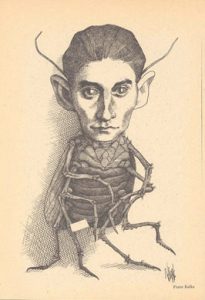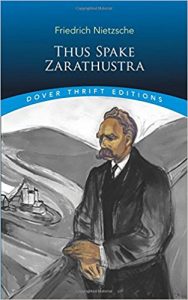*Here is my powerpoint: Kafka’s Existential Posture
My dear peers,
So, The Castle (Kafka’s third and final novel) is quite long, so I will not attach the novel but I will recommend certain passages (vs) chapters. I hope you’ll keep the themes of Melancholy, Delay, Subordination and Infinity in mind. It would truly take the entire novel to capture the mood and environment of the novel, so I think focusing on short stories will be best for now.
Firstly, to give context to Kafka’s work (specifically, the mood and posture of his work…as existence precedes essence after all…) please read pages (15-32) of Kafka’s Letter to my Father
The Castle passages:
pp.13
But K. was distracted, fretting at this conversation. For the first time since his arrival he felt real weariness. At first the long journey here had not seemed to affect him at all—and he had walked for days, step after step, on and on!—but now all that physical strain was claiming its due, and at just the wrong time. He was irresistibly drawn to seek new acquaintances, but every new acquaintance left him wearier than ever. If he forced himself to walk at least as far as the entrance to the castle, that was more than enough in his present state. So he walked on, but it was a long way. For he was in the main street of the village, and it did not lead to Castle Mount but merely passed close to it before turning aside, as if on purpose, and although it moved no further away from the castle, it came no closer either. K. kept thinking that the road must finally bring him to the castle, and, if only because of that expectation, he went on. (pp.13)
pp.106
And now when after finishing his work in the stable, the coachman walked straight across the courtyard with his slow, swaying gait, closed the large gate, then came back, all this slowly and meticulously, focusing only on his own tracks in the snow, then locked the stable behind him, and all the electric lights went out –for whom should they have shone?–and only the opening above in the wooden gallery remained bright and briefly arrested one’s wandering gaze, it seemed to K. as if they had broken off all contact with him, but as if he were freer than ever and could wait as long as he wanted here in this place where he was generally not allowed, and as if he had fought for this freedom for himself in a manner nobody else could have done and as if nobody could touch him or drive him away, or even speak to him, yet–and this conviction was at least equally strong–as if there were nothing more senseless, nothing more desperate, than this freedom, this waiting, this invulnerability.
pp. 236
With the loquacity of the happy man, we must explain it all. Without sparing ourselves in the slightest, we must show at length what has happened and why, how extraordinarily rare and uniquely great the opportunity is, we must show how the member of the public who, with all the helplessness of which only a member of the public can be capable, has walked by chance into his opportunity, we must show him, Mr Land Surveyor, how the member of the public can now control everything if he wants to, and 236 The Castle need do nothing but somehow or other make his request, there is a document for granting it already prepared, we say, ready to be handed to him—we must go into all that. It is a dark hour for an official. But when you have done that, Mr Land Surveyor, what’s most necessary has been done, and you must possess your soul in patience and wait
I hope that you will read the following short stories (less than a few pages per story) that capture the essential Kafka spirit

Story 1: The Excursion to the Mountains
Story 2: Unhappiness
Story 3: The Trees
Story 4: The Bucket Rider
A recording of me reading the Bucket Rider (excuse the white noise)
Story 5: The Window on The Street
Another…The Window on The Street
